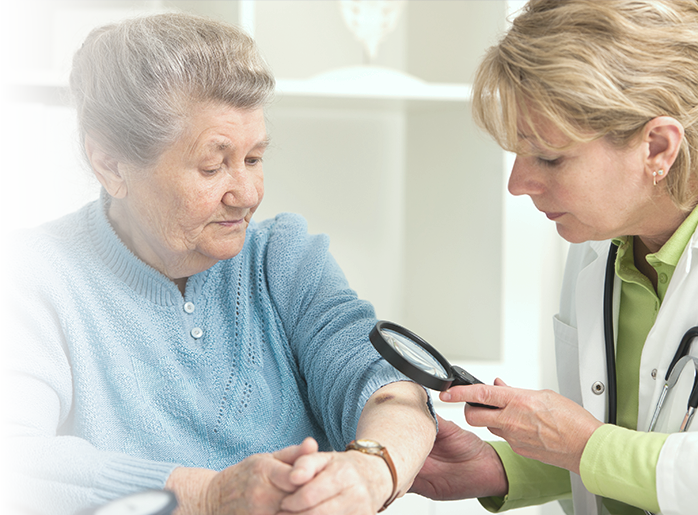Psoriasis
Know More: Psoriasis
Trustworthy information, straight from the source. Education is the first step in an empowering healthcare plan. Learn more about psoriasis, from prevention to diagnosis and treatment.

Condition Overview
What is psoriasis?
Psoriasis is a long-term skin disease in which the skin cells grow faster than normal. This abnormal growth causes a buildup of cells on the surface of the skin. Red, raised patches that are covered with silver-colored scales form on your skin.
Risk Prevention
What causes psoriasis?
The exact cause of psoriasis is not known. A problem with the immune system sometimes causes your body to attack healthy skin cells. Psoriasis is more likely to occur if another family member also has psoriasis. Flare-ups of psoriasis come and go and are often caused by certain triggers, including:
- Infections: Germs, such as bacteria, viruses, or fungi, may trigger a flare-up. A flare-up of psoriasis usually follows a sore throat.
- Medicines: Certain medicines, such as those used to treat high blood pressure or depression, may trigger a psoriasis flare-up.
- Skin damage: Skin injuries, such as a cut or scrape, or a sunburn may increase your risk of a flare-up.
- Smoking and alcohol: Smoking and drinking alcohol may also increase your risk.
- Stress: Both physical and emotional stress may lead to a flare-up of psoriasis.
What are the risks of psoriasis?
Certain medicines used to treat psoriasis can cause burning, redness, and irritation of your skin. They can also cause drowsiness, high blood pressure, or birth defects. Without treatment, your signs and symptoms may worsen. Psoriasis may cause severe itching, swelling, and infection. You may also bleed more easily.
Diagnosis & Treatment Options
What are the signs and symptoms of psoriasis?
The signs and symptoms usually depend on the type of psoriasis you have. Types include:
- Plaque type: This is the most common and mildest type of psoriasis. Plaques are reddened patches covered with silver-colored scales. Your knees, elbows, scalp, stomach, and back are usually affected. You may also have nail changes, such as pitting, thickening, or lifting of the nails off the nail bed.
- Guttate type: This type is the most common among children and young adults. It usually happens after a sore throat or other infections. This type looks like red, raised, pea-sized drops on your skin.
- Inverse type: The plaques appear as smooth red patches and are often found in the moist areas of your body. It affects skin in the armpits, groin, under breasts, and around the genitals.
- Erythrodermic type: This is a rare and severe type of psoriasis in which plaques cover large areas of the skin. These areas itch and are painful.
- Pustular type: Pustules (blisters with pus inside) or pimple-like lesions may appear on large red areas of the skin. Sometimes this type is limited to the palms of the hands and soles of the feet.
- Psoriatic arthritis: Some people who have psoriasis may also develop psoriatic arthritis. Psoriatic arthritis makes your joints swollen and painful. You may also have nail changes, such as pitting, thickening, or lifting of the nails off the nail bed.
How is psoriasis treated?
Treatment usually depends on the severity of the disease, size of the areas involved, and the type of psoriasis. Treatments can include:
- Topical medicine: These medicines are ointments, creams, and pastes that are applied on the skin.
- Moisturizers: These soothe your skin by keeping it moist and preventing dryness.
- Steroids: This medicine may be given to decrease inflammation.
- Vitamin D and retinoids: These are vitamin-based creams that are used to clear plaques.
- Anthralin: This medicine decreases swelling and excess skin cells that form scales.
- Salicylic acid: This peeling agent helps decrease scaling of the skin and scalp.
- Tar preparations: These medicines decrease itching, scaling, and inflammation. They may be shampoos, creams, or bath oils.
- Oral medicine: These medicines are used to treat serious types of psoriasis and are taken by mouth. They include steroids or retinoids. They may also include medicines that decrease the rate of growth of your skin cells or that affect your immune system.
- Phototherapy: You may need ultraviolet (UV) light treatments if your psoriasis is severe. Your skin is exposed to UV light for the period of time that your healthcare provider prescribes.
Preparing for Care
What should I talk to my provider about regarding my psoriasis?
You should come to your appointment with a list of any questions you have about your condition and overall health. Your doctor will ask about your health history. He or she may also want to know if you have other family members who have psoriasis. Psoriasis is usually diagnosed after a careful examination of your skin, scalp, and nails. Blood tests and X-rays may also be needed.
Contact your provider if:
- You are pregnant.
- You have a fever.
- Your skin plaques are not getting better or are getting worse.
- You cannot sleep because your skin itches.
- Your skin plaques have pus draining from them or they have soft yellow scabs.
- You have questions or concerns about your condition or care.
Seek immediate care if your psoriasis suddenly covers larger areas of your body and becomes more painful.
